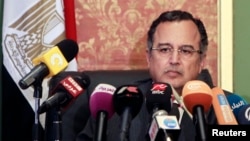Egypt says it will re-examine its diplomatic relations with Syria, which became strained under the government of President Mohamed Morsi, who was ousted earlier this month.
Egypt's new foreign minister, Nabil Fahmy, said Saturday that the interim government has no intention of waging what he called a holy war against Syria, but that Egypt supports changes there. He stressed that while the relationship will be re-examined, it does not necessarily mean closer ties will result.
"There will be a change, everything will be re-evaluated. I don't mean whether the relationship between the two countries will return to normal or not, but what I can say frankly to you is that there is no intention of jihad in Syria," he said.
Last month Egypt closed its embassy in Damascus and shut down the Syrian mission in Cairo citing the bloodshed during more than two years of the civil war. During his year in power, President Morsi called on Syrian President Bashir al-Assad to step down and urged the international community to impose a no-fly zone over Syria. His ruling Muslim Brotherhood movement last month joined a call by some Sunni clerics for a jihad against the Syrian government and its Shi'ite allies.
Mr. Morsi was deposed on July 3 following massive protests against his Islamist-dominated government. His supporters have since demonstrated, demanding his return to power. Scores of people have been killed and wounded in street violence since his ouster.
Pro-Morsi demonstrations took place across Egypt Friday and also in Jordan's capital, Amman. At least three people were killed during clashes between Morsi's supporters and his opponents in Egypt's Nile Delta city of Mansoura.
Thousands of Morsi loyalists continued a sit-in protest in Cairo's Rabaa al-Adawiya mosque Saturday.
Egypt's new foreign minister, Nabil Fahmy, said Saturday that the interim government has no intention of waging what he called a holy war against Syria, but that Egypt supports changes there. He stressed that while the relationship will be re-examined, it does not necessarily mean closer ties will result.
"There will be a change, everything will be re-evaluated. I don't mean whether the relationship between the two countries will return to normal or not, but what I can say frankly to you is that there is no intention of jihad in Syria," he said.
Last month Egypt closed its embassy in Damascus and shut down the Syrian mission in Cairo citing the bloodshed during more than two years of the civil war. During his year in power, President Morsi called on Syrian President Bashir al-Assad to step down and urged the international community to impose a no-fly zone over Syria. His ruling Muslim Brotherhood movement last month joined a call by some Sunni clerics for a jihad against the Syrian government and its Shi'ite allies.
Mr. Morsi was deposed on July 3 following massive protests against his Islamist-dominated government. His supporters have since demonstrated, demanding his return to power. Scores of people have been killed and wounded in street violence since his ouster.
Pro-Morsi demonstrations took place across Egypt Friday and also in Jordan's capital, Amman. At least three people were killed during clashes between Morsi's supporters and his opponents in Egypt's Nile Delta city of Mansoura.
Thousands of Morsi loyalists continued a sit-in protest in Cairo's Rabaa al-Adawiya mosque Saturday.





